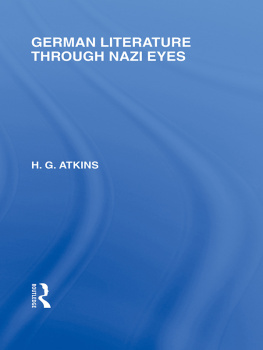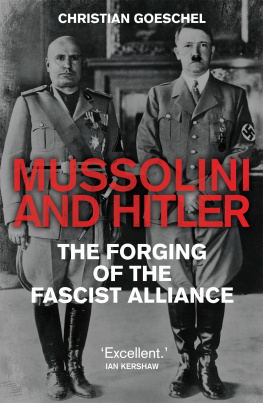ROUTLEDGE LIBRARY EDITIONS: RESPONDING TO FASCISM
ENTER MUSSOLINI
ENTER MUSSOLINI
Observations and Adventures of an Anti-Fascist
EMILIO LUSSU
Translated from the Italian by
MARION RAWSON
With a Preface by
WICKHAM STEED
Volume 4
First published in English 1936
This edition first published in 2010
by Routledge
2 Park Square, Milton Park, Abingdon, Oxon, OX14 4RN
Simultaneously published in the USA and Canada
by Routledge
270 Madison Avenue, New York, NY 10016
Routledge is an imprint of the Taylor & Francis Group, an informa business
This edition published in the Taylor & Francis e-Library, 2010.
To purchase your own copy of this or any of Taylor & Francis or Routledges collection of thousands of eBooks please go to www.eBookstore.tandf.co.uk.
1936 Methuen & Co. Ltd.
All rights reserved. No part of this book may be reprinted or reproduced or utilised in any form or by any electronic, mechanical, or other means, now known or hereafter invented, including photocopying and recording, or in any information storage or retrieval system, without permission in writing from the publishers.
British Library Cataloguing in Publication Data
A catalogue record for this book is available from the British Library
ISBN 0-203-85021-1 Master e-book ISBN
ISBN 10: 0-415-57699-7 (Set)
eISBN 10: 0-203-85012-2 (Set)
ISBN 10: 0-415-58075-7 (Volume 4)
eISBN 10: 0-203-85021-1 (Volume 4)
ISBN 13: 978-0-415-57699-4 (Set)
eISBN 13: 978-0-203-85012-1 (Set)
ISBN 13: 978-0-415-58075-5 (Volume 4)
eISBN 13: 978-0-203-85021-3 (Volume 4)
Publishers Note
The publisher has gone to great lengths to ensure the quality of this reprint but points out that some imperfections in the original copies may be apparent.
Disclaimer
The publisher has made every effort to trace copyright holders and would welcome correspondence from those they have been unable to trace.
ENTER MUSSOLINI
Observations and Adventures of an Anti-Fascist
by
EMILIO LUSSU
Translated from the Italian by
MARION RAWSON
With a Preface by
WICKHAM STEED

This book was first published in Italian under the title of Marcia su Roma e dintorni
This translation first published in 1936
PREFACE TO THE ENGLISH EDITION
by
WICKHAM STEED
I KNOW of nothing better than this book in all that has been written upon Italian Fascism. It is an unconscious work of art, a little masterpiece that should outlast its subject. In form it is a personal record and a fragment of history. In substance it is an essay in the humour of things, grim and comic, and it is as free from bitterness as from striving after effect. What might easily have become a satire on human nature has resolved itself into the psychological study of an epoch which posterity would have found a riddle harder to read had not Emilio Lussu anatomized the folly of its wisdom with his squandering glances.
He is a Sardinian. Throughout the war he fought gallantly on the Italian front. Not till the enemy was laid low did he doff his uniform and return to his work at the Bar, and to political life as a Member of Parliament for his native island. He saw the beginnings of Fascism and the conditions under which it arose. Soon he found the home front no less adventurous than the first-line trenches had been, and demanding a higher degree of moral courage. Fearlessness, physical and civic, and imperturbable self-control are so much a part of his nature that he seems unaware of them. Only when others lack them is he mildly astonished. Thus wordy indignation is as alien to him as any itch to dramatize the part he played amid the brutal scenes which marked the downfall of Liberal Italy and the rise and triumph of Mussolini and the Blackshirts. In his account of these matters he persuades by reticence and emphasizes by under-statement.
He is fortunate in the moment when the English version of his book appears. Had it been issued soon after he wrote it, four or five years ago, it might have passed almost unnoticed. In the late summer of 1929 his name had, it is true, made a certain noise in the world. His escape, with two of his fellow-prisoners, from the inferno on the island of Lipari to which Mussolini had consigned them was too daring an exploit to be altogether ignored. A Member of Parliament, a distinguished professor of political economy, and the nephew of a former Prime Minister could not be snatched from Mussolinis clutches without causing a little stir in countries where human right and freedom were still esteemed. So the well-planned escapade which ended the durance of Emilio Lussu, Carlo Rosselli, and Fausto Nitti was a sort of nine days wonder.
Mussolini winced. Characteristically, he sought to avenge himself upon Professor Rossellis English wife until the British Foreign Office stayed his hand. But presently those minds which, even in Great Britain and the United States, were be-glamoured by Fascism, returned to their worship of the Duce, and ceased to take thought for the morrow. The deadly straightforwardness of Lussus story would have irked them. They could hardly have dismissed it as a piece of vain girding at their hero by yet another refugee from an Italy whose people had got what was probably good for them or, at any rate, might be wholesome if it was not good. Lussu would have made Popes lines ring hollow:
For forms of government let fools contest
Whateer is best administered is best.
Without audible demur eminent Britons and others, some of them responsible statesmen, therefore continued to pay homage to the Italian Dictator. Had he not saved Italy from Communism and taught discipline and order to a notoriously undisciplined and dishevelled nation? Were not Italian trains now punctual? Had not beggars ceased to molest touristsfor whose delectation Italy, of course, existsin the squares and streets of Italian cities? In the light of these great things why worry over a few hundred beatings and murderings, a few thousand arrests or twenty thousand deportations? Gold-braided diplomatists, millionaire newspaper-owners and their obedient scribes, captains of industry and literary tuft-hunters knew better than to trouble about such trifles. And to their chorus of approval the great Duce himself added his self-adulatory effusions which the World Press eagerly bought and prominently displayed.
But now? Not all is well with the fair land of Italy. Even Mussolini comes in for criticism. His Abyssinian adventure, undertaken in search of indispensable glory for his bankrupt system, has cooled the ardour of his foreign admirers. The fellow must be mad! say those who yesterday bowed low at his feet. How will it all end? It may be merely bluff; though threats to smash Gibraltar, to give the British Fleet in the Mediterranean something to think about, and to invade Egypt from Lybia, are at best a sorry sort of joke. Why do the Italians put up with him? They must see that he is leading them to disaster! It is really time to take stock of things.
This is precisely where Lussus book comes in. If people in English-reading countries wish to take stock of things, they cannot do better than heed Emilio Lussus truthful tale. Then they may ask: Do men gather grapes of thorns, or figs of thistles? Lussu shows how the thorns and thistles grew, and that they were there from the firstas discerning Italians, and some others, have been telling Mussolinis dupes for years past. Men of standing and weight like Count Sforza, Don Luigi Sturzo, Professor Salvemini, Francesco Luigi Ferrari, and many another outcast from the Mussolinian paradise have uttered warning after warning that the day of judgment upon Fascism could not be for ever delayed and that it might well be a














